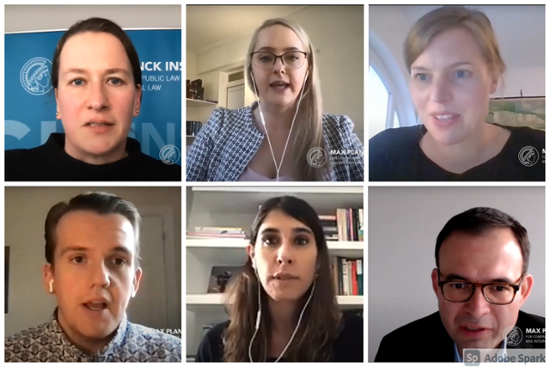You are here: Institute The Institute Berlin Office Events Heidelberger Salon HD Salon 03.03.21

As the COVID-19 pandemic rages and the threat of fast-spreading mutations from the UK, South Africa and Brazil looms, effective vaccines have sparked hope all around the world. In some States, however, this hope has been short-lived as high-income countries like Germany or the UK have started hoarding COVID-19 vaccines to be the first to inoculate their populations. The practice of so called “vaccine nationalism” leaves populations of low- to middle-income countries largely unable to procure vaccines as a result.
On Wednesday, 3 March 2021, MPIL’s Berlin office hosted its second Heidelberger Salon digital of this year on the pressing global issue of “Vaccine Nationalism” and Distributive Justice: The Role of Global Health Law.
The timely debate, moderated by Alexandra Kemmerer, shed light on the issue from a variety of different perspectives – both in terms of geography and fields of expertise. The panel of experts was composed of Alexandra Phelan (Georgetown University), Maike Voss (SWP Berlin), Mark Eccleston-Turner (Keele University) and Pedro Villarreal. Journalist Letícia Casado, regular contributor and stringer for The New York Times (based in Brasília), and incoming MPIL Journalist in Residence 2021, shared her observations of Brazil’s failure to mount a robust vaccination campaign, currently the key topic of her reporting for the NYT.
As a starting point for the discussion, Letícia Casado gave insights into the devastating situation in Brazil, which is overwhelmed by the virus: inexperienced political leaders and a populist president not taking COVID-19 seriously, large parts of the population neglecting the necessary precautions and, hence, overcrowded hospitals. But worst of all, without sufficient access to effective vaccines, there is no end in sight.
Subsequently, Maike Voss, Mark Eccleston-Turner, Pedro Villarreal and Alexandra Phelan contrasted this account with their global perspectives as international law, international relations and global health governance experts.
Maike Voss began by criticising States’ initial inaction and lack of support for other, even neighbouring, States at the beginning of the pandemic. The situation of Italy served as an example for the failure of European solidarity. By the time global efforts to fight the pandemic in a spirit of solidarity were made, however, wealthy nations had already started hoarding COVID-19 vaccines at the expense of others.
Mark Eccleston-Turner further analysed the matters and processes that have led to that “failure of multilateralism” from a legal perspective. Hereby, he put particular focus on how advance purchase agreements of high-income countries together with difficulties of the WHO vaccine scheme COVAX have led to temporal inequality in vaccine rollout.
Pedro Villarreal elaborated on the tension between States’ human rights obligations – most notably regarding the right to health – and intellectual property (IP) rights that limit the production of and access to COVID-19 vaccines by low- and middle-income countries. With regard to the proposal at the WTO for a waiver of IP rights for COVID-19 vaccines which is under current debate, he remained critical towards its potential as the ultimate solution to blocked access of vaccines.
Finally, Alexandra Phelan, who works as a scholar with an interdisciplinary academic background in the Global Public Health field, at the intersection of international law and life sciences, wrought together the findings of the panel by making a proposal for an international legal system for future pandemics.
In the following Q&A, a total of 26 registered participants had the chance to actively contribute to the ongoing discussion by posing questions to the panelists and sharing their own thoughts on the issues that were raised throughout the discussion.
There is much that the international community could and should have done earlier in response to the pandemic. One year later, despite efforts to address vaccine access – above all through the creation of COVAX – disparities remain. However, it is not too late to address the global inequality that was exposed by the pandemic. An equitable vaccine distribution is vital for combating the acute phase of the COVID-19 pandemic and for allowing the rebuilding of societies and economies.
Report: Laura Kraft
via Zoom / Livestream

By loading the video, you accept YouTube's privacy policy.
A recording of the event is available at https://www.youtube.com/watch?v=O4us6dtd48g. The Heidelberger Salon digital was livestreamed via Verfassungsblog and Völkerrechtsblog.